Contract Law Case Study: Analysis of Lame Duck Restaurant's Contracts
VerifiedAdded on 2021/02/20
|9
|2427
|175
Case Study
AI Summary
This case study delves into contract law principles through the scenario of Johnny, the owner of the Lame Duck Restaurant, and his employee Summer. The case examines a series of contractual issues, including the initial agreement for website design and menu revamping, and a subsequent contract for a banquet hall. The study explores the essential elements of a contract, such as offer, acceptance, and consideration, using the Competition and Consumer Act 2010 as a reference. It then analyzes the concept of mistake in contract law, differentiating between common, mutual, unilateral, and non est factum mistakes, referencing the case of Petelin v Cullen. Finally, the case study addresses the breach of contract, outlining remedies like debts and liquidated damages, with the Baltic Shipping v Dillon case serving as an example. The analysis concludes with the legal obligations of Johnny regarding the banquet hall contract, with an emphasis on the consequences of breaching the contract.
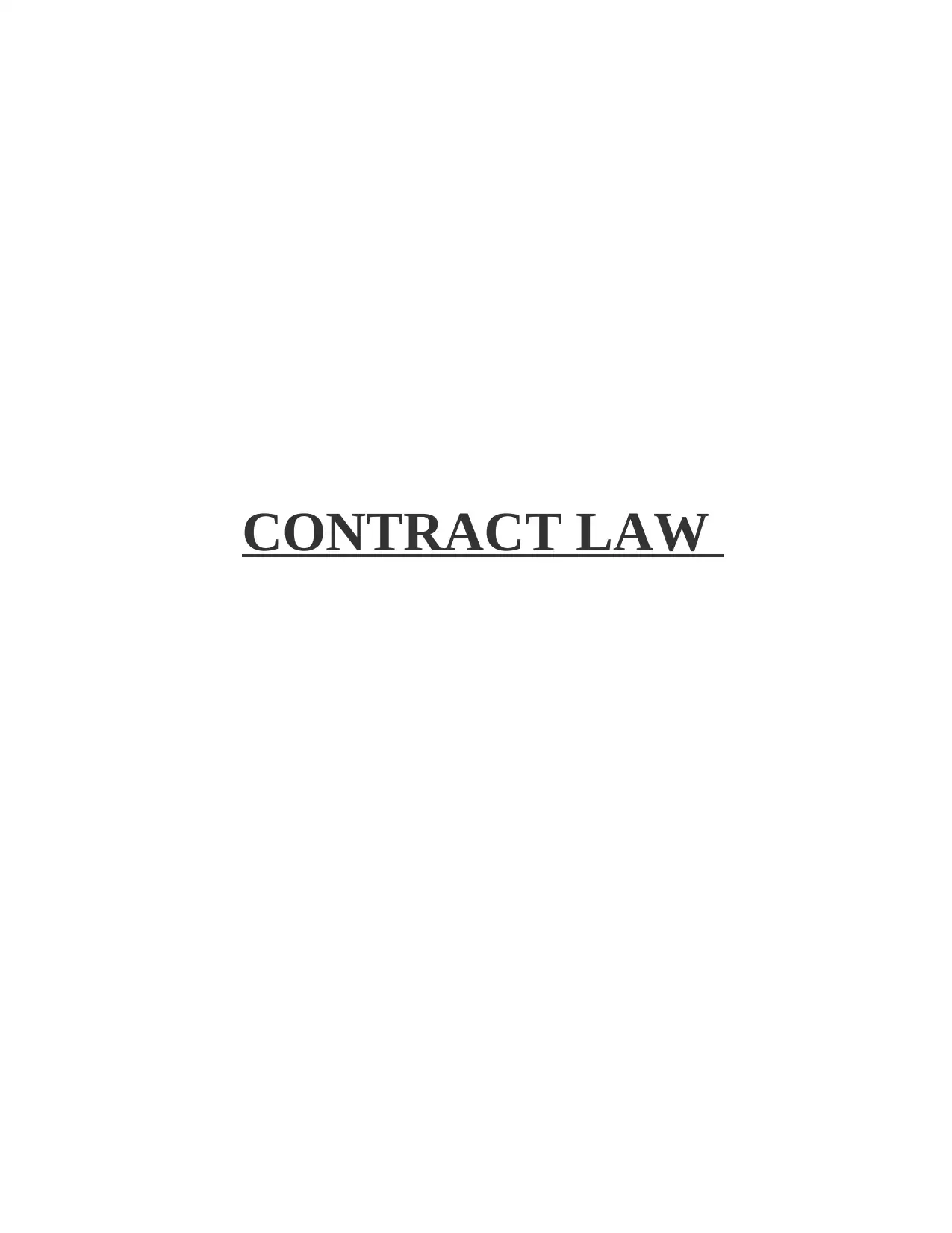
CONTRACT LAW
Paraphrase This Document
Need a fresh take? Get an instant paraphrase of this document with our AI Paraphraser
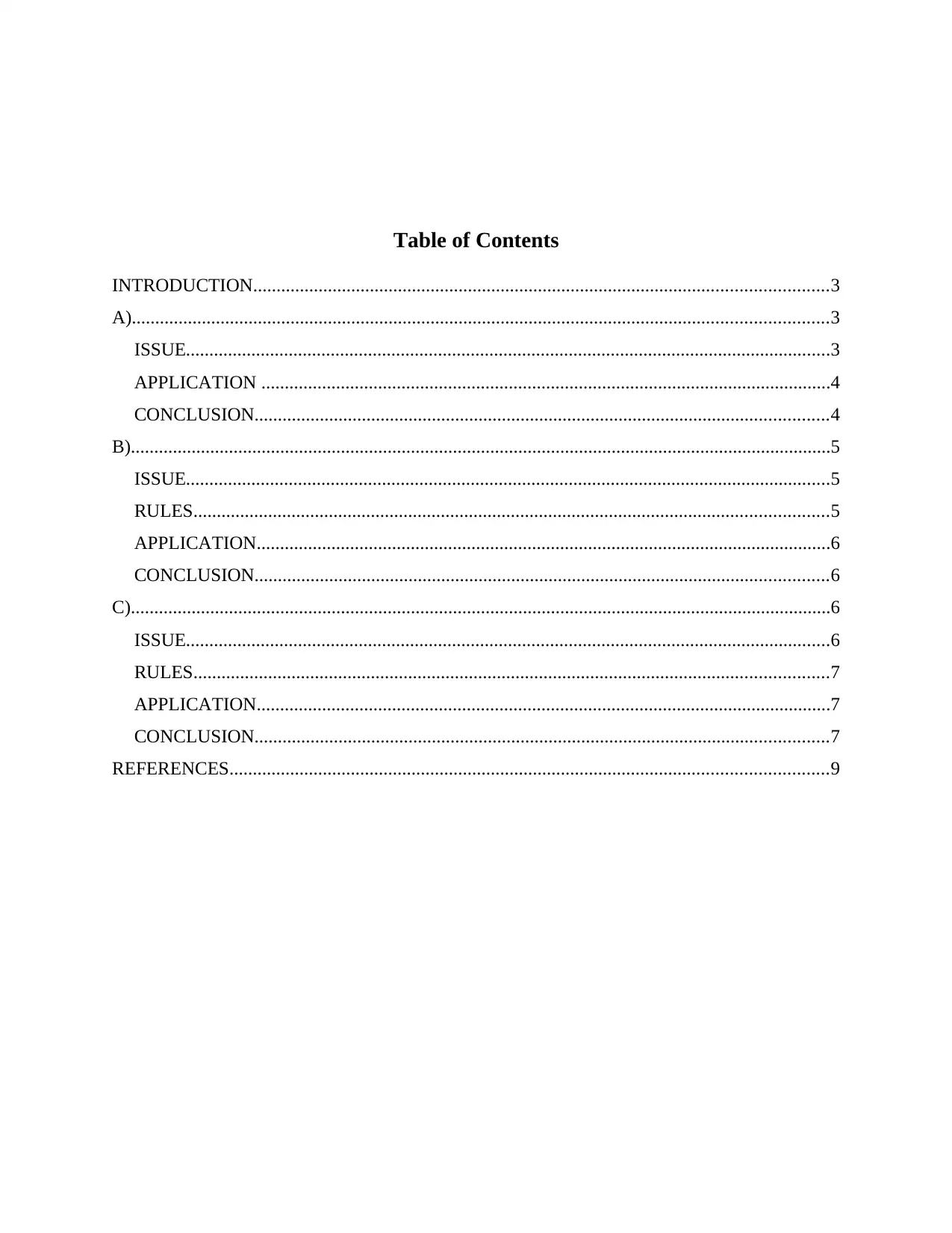
Table of Contents
INTRODUCTION...........................................................................................................................3
A).....................................................................................................................................................3
ISSUE..........................................................................................................................................3
APPLICATION ..........................................................................................................................4
CONCLUSION...........................................................................................................................4
B)......................................................................................................................................................5
ISSUE..........................................................................................................................................5
RULES........................................................................................................................................5
APPLICATION...........................................................................................................................6
CONCLUSION...........................................................................................................................6
C)......................................................................................................................................................6
ISSUE..........................................................................................................................................6
RULES........................................................................................................................................7
APPLICATION...........................................................................................................................7
CONCLUSION...........................................................................................................................7
REFERENCES................................................................................................................................9
INTRODUCTION...........................................................................................................................3
A).....................................................................................................................................................3
ISSUE..........................................................................................................................................3
APPLICATION ..........................................................................................................................4
CONCLUSION...........................................................................................................................4
B)......................................................................................................................................................5
ISSUE..........................................................................................................................................5
RULES........................................................................................................................................5
APPLICATION...........................................................................................................................6
CONCLUSION...........................................................................................................................6
C)......................................................................................................................................................6
ISSUE..........................................................................................................................................6
RULES........................................................................................................................................7
APPLICATION...........................................................................................................................7
CONCLUSION...........................................................................................................................7
REFERENCES................................................................................................................................9
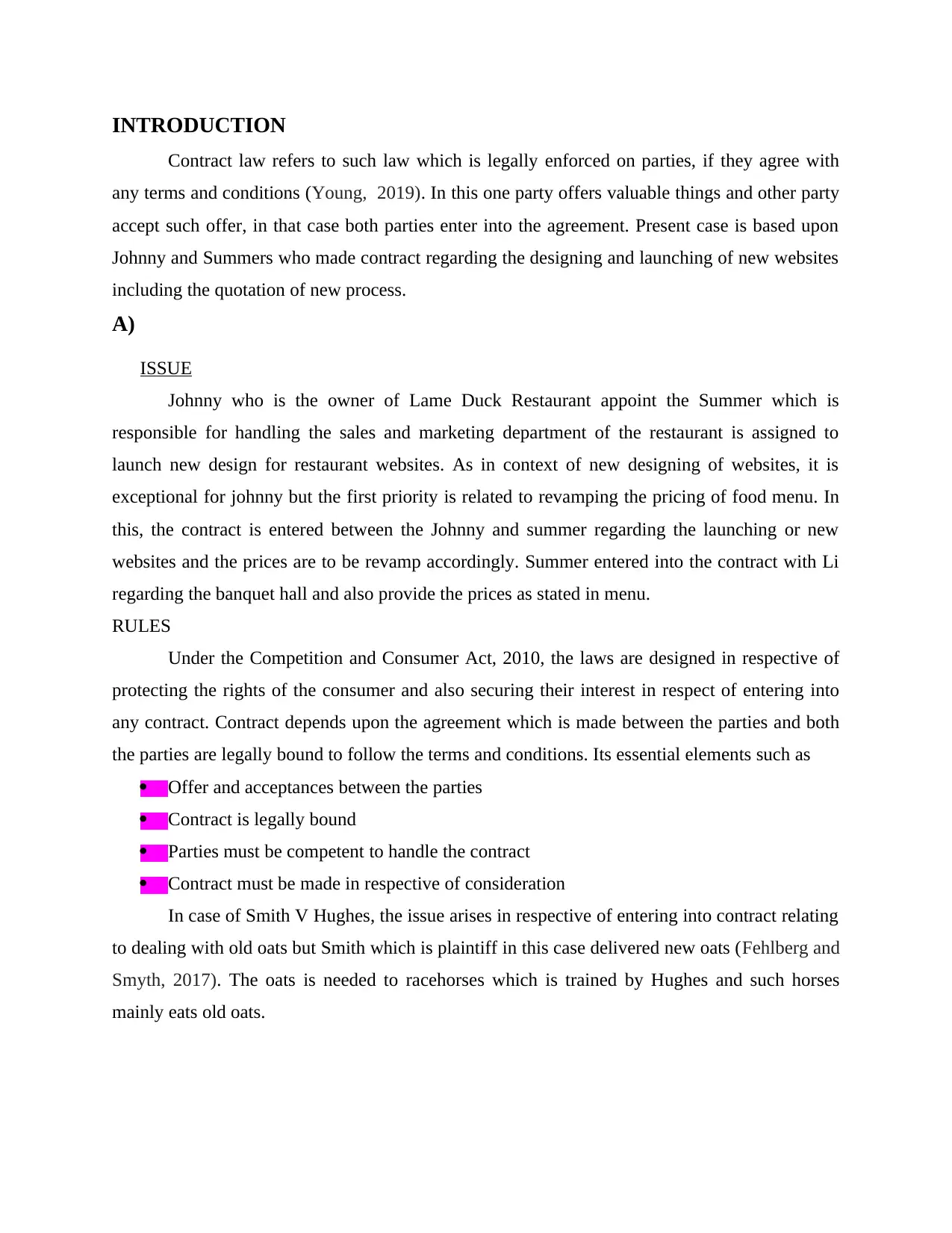
INTRODUCTION
Contract law refers to such law which is legally enforced on parties, if they agree with
any terms and conditions (Young, 2019). In this one party offers valuable things and other party
accept such offer, in that case both parties enter into the agreement. Present case is based upon
Johnny and Summers who made contract regarding the designing and launching of new websites
including the quotation of new process.
A)
ISSUE
Johnny who is the owner of Lame Duck Restaurant appoint the Summer which is
responsible for handling the sales and marketing department of the restaurant is assigned to
launch new design for restaurant websites. As in context of new designing of websites, it is
exceptional for johnny but the first priority is related to revamping the pricing of food menu. In
this, the contract is entered between the Johnny and summer regarding the launching or new
websites and the prices are to be revamp accordingly. Summer entered into the contract with Li
regarding the banquet hall and also provide the prices as stated in menu.
RULES
Under the Competition and Consumer Act, 2010, the laws are designed in respective of
protecting the rights of the consumer and also securing their interest in respect of entering into
any contract. Contract depends upon the agreement which is made between the parties and both
the parties are legally bound to follow the terms and conditions. Its essential elements such as
Offer and acceptances between the parties
Contract is legally bound
Parties must be competent to handle the contract
Contract must be made in respective of consideration
In case of Smith V Hughes, the issue arises in respective of entering into contract relating
to dealing with old oats but Smith which is plaintiff in this case delivered new oats (Fehlberg and
Smyth, 2017). The oats is needed to racehorses which is trained by Hughes and such horses
mainly eats old oats.
Contract law refers to such law which is legally enforced on parties, if they agree with
any terms and conditions (Young, 2019). In this one party offers valuable things and other party
accept such offer, in that case both parties enter into the agreement. Present case is based upon
Johnny and Summers who made contract regarding the designing and launching of new websites
including the quotation of new process.
A)
ISSUE
Johnny who is the owner of Lame Duck Restaurant appoint the Summer which is
responsible for handling the sales and marketing department of the restaurant is assigned to
launch new design for restaurant websites. As in context of new designing of websites, it is
exceptional for johnny but the first priority is related to revamping the pricing of food menu. In
this, the contract is entered between the Johnny and summer regarding the launching or new
websites and the prices are to be revamp accordingly. Summer entered into the contract with Li
regarding the banquet hall and also provide the prices as stated in menu.
RULES
Under the Competition and Consumer Act, 2010, the laws are designed in respective of
protecting the rights of the consumer and also securing their interest in respect of entering into
any contract. Contract depends upon the agreement which is made between the parties and both
the parties are legally bound to follow the terms and conditions. Its essential elements such as
Offer and acceptances between the parties
Contract is legally bound
Parties must be competent to handle the contract
Contract must be made in respective of consideration
In case of Smith V Hughes, the issue arises in respective of entering into contract relating
to dealing with old oats but Smith which is plaintiff in this case delivered new oats (Fehlberg and
Smyth, 2017). The oats is needed to racehorses which is trained by Hughes and such horses
mainly eats old oats.
⊘ This is a preview!⊘
Do you want full access?
Subscribe today to unlock all pages.

Trusted by 1+ million students worldwide
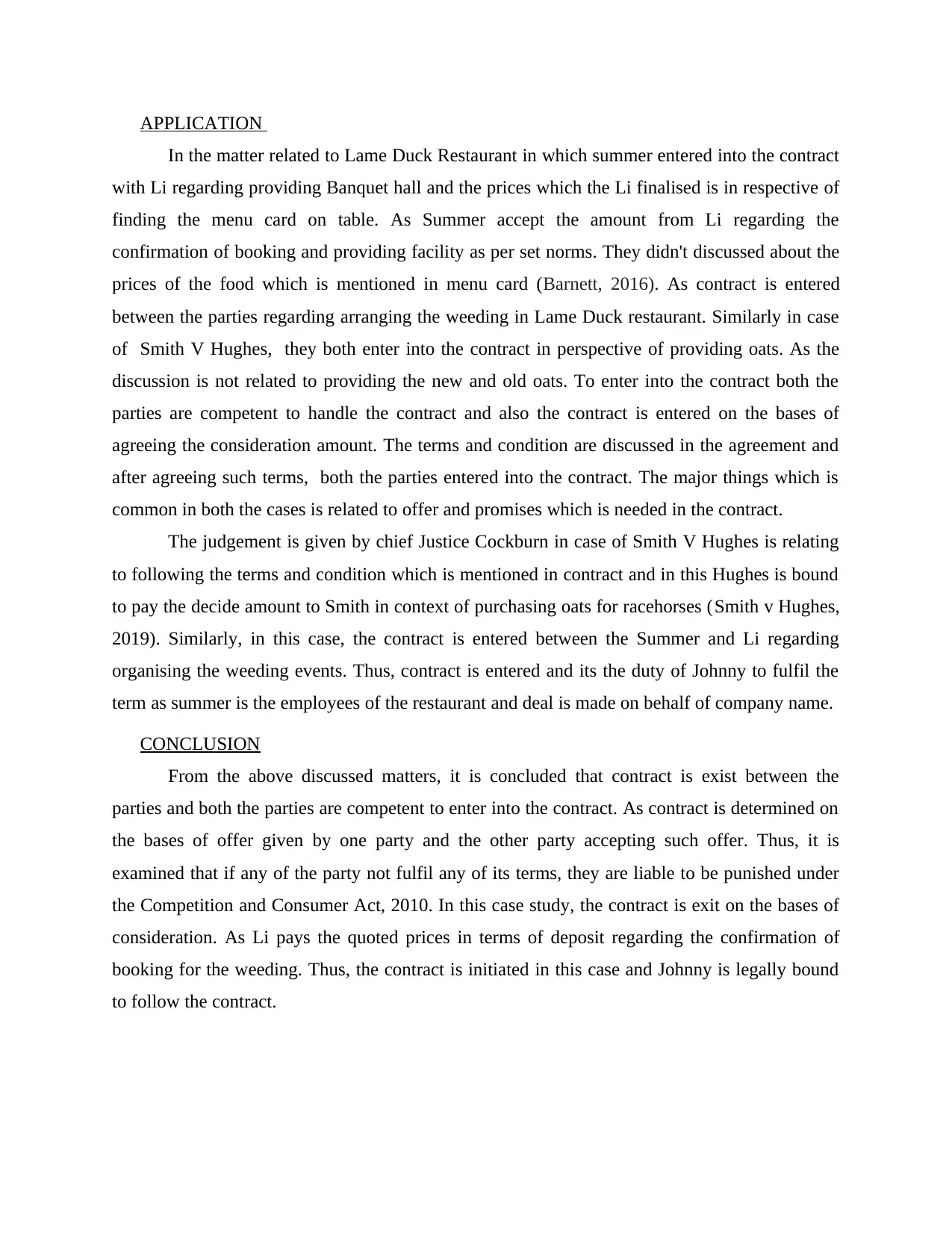
APPLICATION
In the matter related to Lame Duck Restaurant in which summer entered into the contract
with Li regarding providing Banquet hall and the prices which the Li finalised is in respective of
finding the menu card on table. As Summer accept the amount from Li regarding the
confirmation of booking and providing facility as per set norms. They didn't discussed about the
prices of the food which is mentioned in menu card (Barnett, 2016). As contract is entered
between the parties regarding arranging the weeding in Lame Duck restaurant. Similarly in case
of Smith V Hughes, they both enter into the contract in perspective of providing oats. As the
discussion is not related to providing the new and old oats. To enter into the contract both the
parties are competent to handle the contract and also the contract is entered on the bases of
agreeing the consideration amount. The terms and condition are discussed in the agreement and
after agreeing such terms, both the parties entered into the contract. The major things which is
common in both the cases is related to offer and promises which is needed in the contract.
The judgement is given by chief Justice Cockburn in case of Smith V Hughes is relating
to following the terms and condition which is mentioned in contract and in this Hughes is bound
to pay the decide amount to Smith in context of purchasing oats for racehorses (Smith v Hughes,
2019). Similarly, in this case, the contract is entered between the Summer and Li regarding
organising the weeding events. Thus, contract is entered and its the duty of Johnny to fulfil the
term as summer is the employees of the restaurant and deal is made on behalf of company name.
CONCLUSION
From the above discussed matters, it is concluded that contract is exist between the
parties and both the parties are competent to enter into the contract. As contract is determined on
the bases of offer given by one party and the other party accepting such offer. Thus, it is
examined that if any of the party not fulfil any of its terms, they are liable to be punished under
the Competition and Consumer Act, 2010. In this case study, the contract is exit on the bases of
consideration. As Li pays the quoted prices in terms of deposit regarding the confirmation of
booking for the weeding. Thus, the contract is initiated in this case and Johnny is legally bound
to follow the contract.
In the matter related to Lame Duck Restaurant in which summer entered into the contract
with Li regarding providing Banquet hall and the prices which the Li finalised is in respective of
finding the menu card on table. As Summer accept the amount from Li regarding the
confirmation of booking and providing facility as per set norms. They didn't discussed about the
prices of the food which is mentioned in menu card (Barnett, 2016). As contract is entered
between the parties regarding arranging the weeding in Lame Duck restaurant. Similarly in case
of Smith V Hughes, they both enter into the contract in perspective of providing oats. As the
discussion is not related to providing the new and old oats. To enter into the contract both the
parties are competent to handle the contract and also the contract is entered on the bases of
agreeing the consideration amount. The terms and condition are discussed in the agreement and
after agreeing such terms, both the parties entered into the contract. The major things which is
common in both the cases is related to offer and promises which is needed in the contract.
The judgement is given by chief Justice Cockburn in case of Smith V Hughes is relating
to following the terms and condition which is mentioned in contract and in this Hughes is bound
to pay the decide amount to Smith in context of purchasing oats for racehorses (Smith v Hughes,
2019). Similarly, in this case, the contract is entered between the Summer and Li regarding
organising the weeding events. Thus, contract is entered and its the duty of Johnny to fulfil the
term as summer is the employees of the restaurant and deal is made on behalf of company name.
CONCLUSION
From the above discussed matters, it is concluded that contract is exist between the
parties and both the parties are competent to enter into the contract. As contract is determined on
the bases of offer given by one party and the other party accepting such offer. Thus, it is
examined that if any of the party not fulfil any of its terms, they are liable to be punished under
the Competition and Consumer Act, 2010. In this case study, the contract is exit on the bases of
consideration. As Li pays the quoted prices in terms of deposit regarding the confirmation of
booking for the weeding. Thus, the contract is initiated in this case and Johnny is legally bound
to follow the contract.
Paraphrase This Document
Need a fresh take? Get an instant paraphrase of this document with our AI Paraphraser
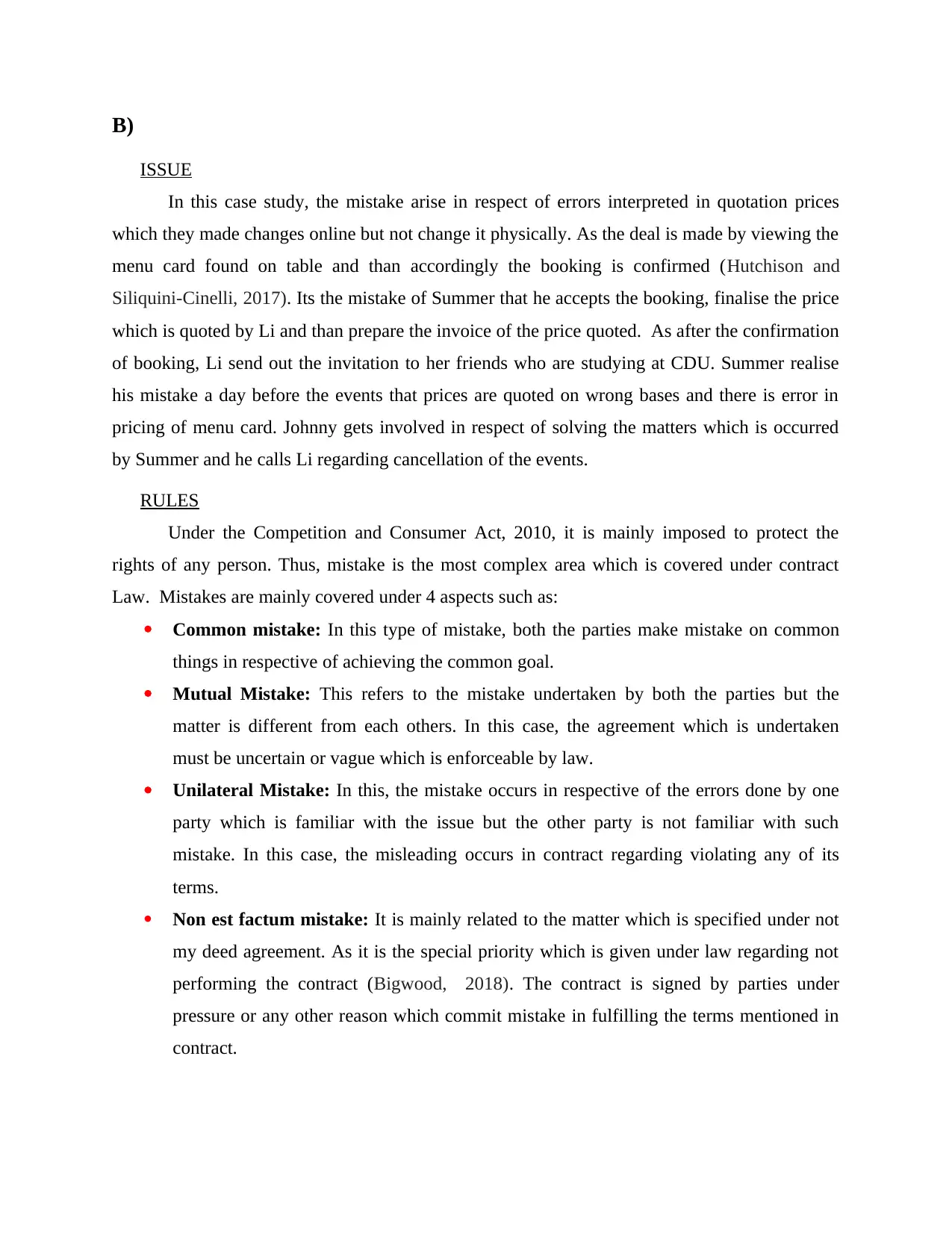
B)
ISSUE
In this case study, the mistake arise in respect of errors interpreted in quotation prices
which they made changes online but not change it physically. As the deal is made by viewing the
menu card found on table and than accordingly the booking is confirmed (Hutchison and
Siliquini-Cinelli, 2017). Its the mistake of Summer that he accepts the booking, finalise the price
which is quoted by Li and than prepare the invoice of the price quoted. As after the confirmation
of booking, Li send out the invitation to her friends who are studying at CDU. Summer realise
his mistake a day before the events that prices are quoted on wrong bases and there is error in
pricing of menu card. Johnny gets involved in respect of solving the matters which is occurred
by Summer and he calls Li regarding cancellation of the events.
RULES
Under the Competition and Consumer Act, 2010, it is mainly imposed to protect the
rights of any person. Thus, mistake is the most complex area which is covered under contract
Law. Mistakes are mainly covered under 4 aspects such as:
Common mistake: In this type of mistake, both the parties make mistake on common
things in respective of achieving the common goal.
Mutual Mistake: This refers to the mistake undertaken by both the parties but the
matter is different from each others. In this case, the agreement which is undertaken
must be uncertain or vague which is enforceable by law.
Unilateral Mistake: In this, the mistake occurs in respective of the errors done by one
party which is familiar with the issue but the other party is not familiar with such
mistake. In this case, the misleading occurs in contract regarding violating any of its
terms.
Non est factum mistake: It is mainly related to the matter which is specified under not
my deed agreement. As it is the special priority which is given under law regarding not
performing the contract (Bigwood, 2018). The contract is signed by parties under
pressure or any other reason which commit mistake in fulfilling the terms mentioned in
contract.
ISSUE
In this case study, the mistake arise in respect of errors interpreted in quotation prices
which they made changes online but not change it physically. As the deal is made by viewing the
menu card found on table and than accordingly the booking is confirmed (Hutchison and
Siliquini-Cinelli, 2017). Its the mistake of Summer that he accepts the booking, finalise the price
which is quoted by Li and than prepare the invoice of the price quoted. As after the confirmation
of booking, Li send out the invitation to her friends who are studying at CDU. Summer realise
his mistake a day before the events that prices are quoted on wrong bases and there is error in
pricing of menu card. Johnny gets involved in respect of solving the matters which is occurred
by Summer and he calls Li regarding cancellation of the events.
RULES
Under the Competition and Consumer Act, 2010, it is mainly imposed to protect the
rights of any person. Thus, mistake is the most complex area which is covered under contract
Law. Mistakes are mainly covered under 4 aspects such as:
Common mistake: In this type of mistake, both the parties make mistake on common
things in respective of achieving the common goal.
Mutual Mistake: This refers to the mistake undertaken by both the parties but the
matter is different from each others. In this case, the agreement which is undertaken
must be uncertain or vague which is enforceable by law.
Unilateral Mistake: In this, the mistake occurs in respective of the errors done by one
party which is familiar with the issue but the other party is not familiar with such
mistake. In this case, the misleading occurs in contract regarding violating any of its
terms.
Non est factum mistake: It is mainly related to the matter which is specified under not
my deed agreement. As it is the special priority which is given under law regarding not
performing the contract (Bigwood, 2018). The contract is signed by parties under
pressure or any other reason which commit mistake in fulfilling the terms mentioned in
contract.
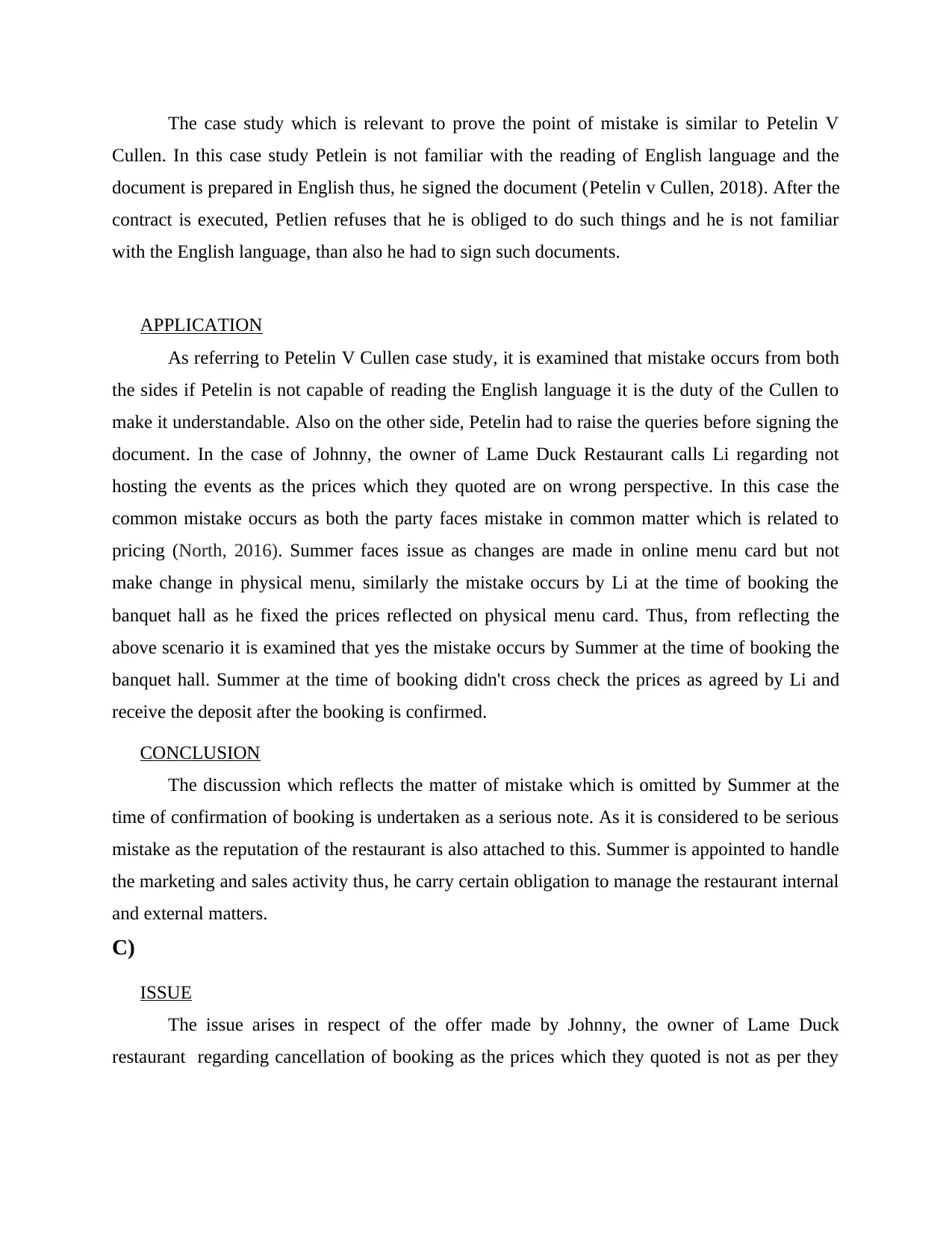
The case study which is relevant to prove the point of mistake is similar to Petelin V
Cullen. In this case study Petlein is not familiar with the reading of English language and the
document is prepared in English thus, he signed the document (Petelin v Cullen, 2018). After the
contract is executed, Petlien refuses that he is obliged to do such things and he is not familiar
with the English language, than also he had to sign such documents.
APPLICATION
As referring to Petelin V Cullen case study, it is examined that mistake occurs from both
the sides if Petelin is not capable of reading the English language it is the duty of the Cullen to
make it understandable. Also on the other side, Petelin had to raise the queries before signing the
document. In the case of Johnny, the owner of Lame Duck Restaurant calls Li regarding not
hosting the events as the prices which they quoted are on wrong perspective. In this case the
common mistake occurs as both the party faces mistake in common matter which is related to
pricing (North, 2016). Summer faces issue as changes are made in online menu card but not
make change in physical menu, similarly the mistake occurs by Li at the time of booking the
banquet hall as he fixed the prices reflected on physical menu card. Thus, from reflecting the
above scenario it is examined that yes the mistake occurs by Summer at the time of booking the
banquet hall. Summer at the time of booking didn't cross check the prices as agreed by Li and
receive the deposit after the booking is confirmed.
CONCLUSION
The discussion which reflects the matter of mistake which is omitted by Summer at the
time of confirmation of booking is undertaken as a serious note. As it is considered to be serious
mistake as the reputation of the restaurant is also attached to this. Summer is appointed to handle
the marketing and sales activity thus, he carry certain obligation to manage the restaurant internal
and external matters.
C)
ISSUE
The issue arises in respect of the offer made by Johnny, the owner of Lame Duck
restaurant regarding cancellation of booking as the prices which they quoted is not as per they
Cullen. In this case study Petlein is not familiar with the reading of English language and the
document is prepared in English thus, he signed the document (Petelin v Cullen, 2018). After the
contract is executed, Petlien refuses that he is obliged to do such things and he is not familiar
with the English language, than also he had to sign such documents.
APPLICATION
As referring to Petelin V Cullen case study, it is examined that mistake occurs from both
the sides if Petelin is not capable of reading the English language it is the duty of the Cullen to
make it understandable. Also on the other side, Petelin had to raise the queries before signing the
document. In the case of Johnny, the owner of Lame Duck Restaurant calls Li regarding not
hosting the events as the prices which they quoted are on wrong perspective. In this case the
common mistake occurs as both the party faces mistake in common matter which is related to
pricing (North, 2016). Summer faces issue as changes are made in online menu card but not
make change in physical menu, similarly the mistake occurs by Li at the time of booking the
banquet hall as he fixed the prices reflected on physical menu card. Thus, from reflecting the
above scenario it is examined that yes the mistake occurs by Summer at the time of booking the
banquet hall. Summer at the time of booking didn't cross check the prices as agreed by Li and
receive the deposit after the booking is confirmed.
CONCLUSION
The discussion which reflects the matter of mistake which is omitted by Summer at the
time of confirmation of booking is undertaken as a serious note. As it is considered to be serious
mistake as the reputation of the restaurant is also attached to this. Summer is appointed to handle
the marketing and sales activity thus, he carry certain obligation to manage the restaurant internal
and external matters.
C)
ISSUE
The issue arises in respect of the offer made by Johnny, the owner of Lame Duck
restaurant regarding cancellation of booking as the prices which they quoted is not as per they
⊘ This is a preview!⊘
Do you want full access?
Subscribe today to unlock all pages.

Trusted by 1+ million students worldwide
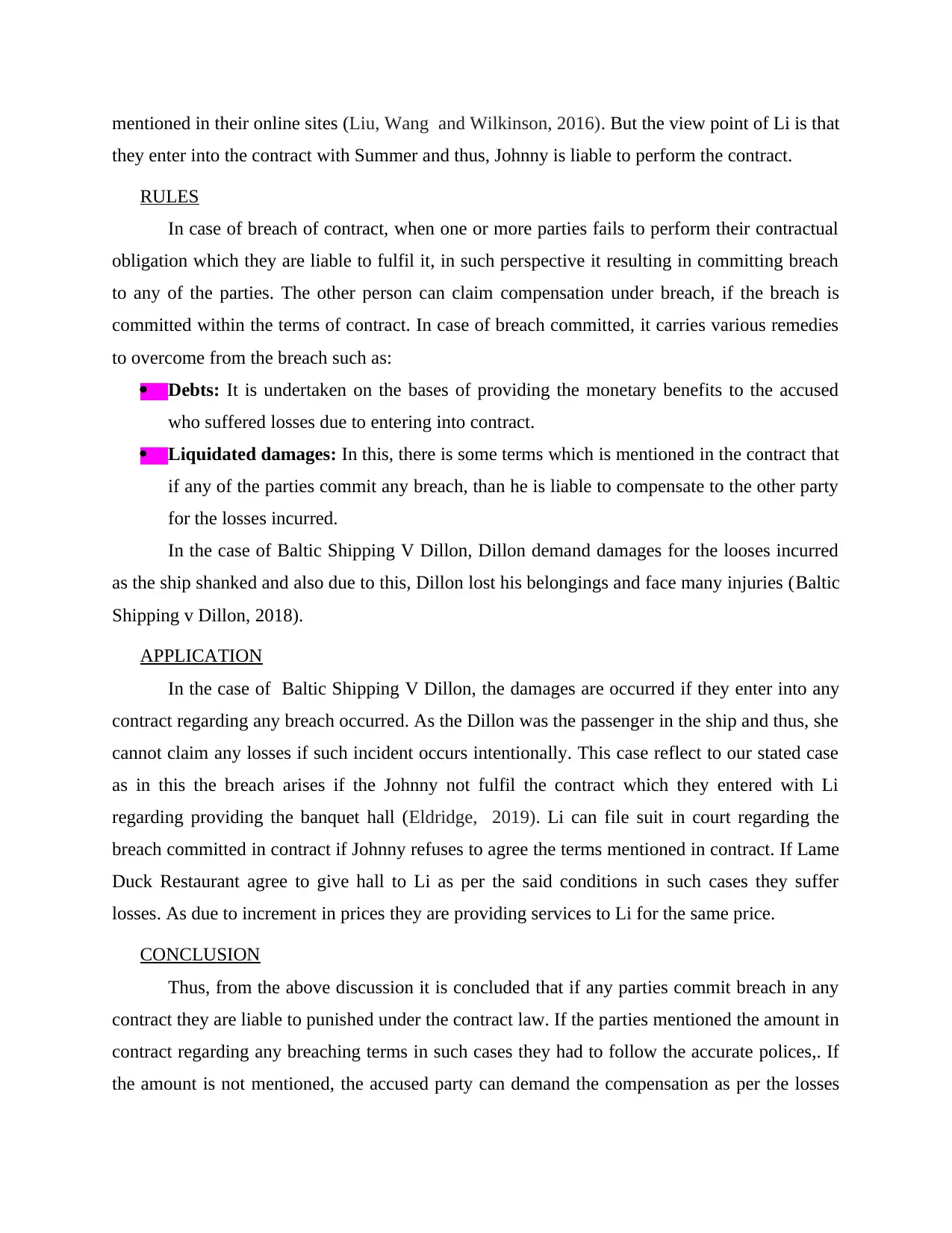
mentioned in their online sites (Liu, Wang and Wilkinson, 2016). But the view point of Li is that
they enter into the contract with Summer and thus, Johnny is liable to perform the contract.
RULES
In case of breach of contract, when one or more parties fails to perform their contractual
obligation which they are liable to fulfil it, in such perspective it resulting in committing breach
to any of the parties. The other person can claim compensation under breach, if the breach is
committed within the terms of contract. In case of breach committed, it carries various remedies
to overcome from the breach such as:
Debts: It is undertaken on the bases of providing the monetary benefits to the accused
who suffered losses due to entering into contract.
Liquidated damages: In this, there is some terms which is mentioned in the contract that
if any of the parties commit any breach, than he is liable to compensate to the other party
for the losses incurred.
In the case of Baltic Shipping V Dillon, Dillon demand damages for the looses incurred
as the ship shanked and also due to this, Dillon lost his belongings and face many injuries (Baltic
Shipping v Dillon, 2018).
APPLICATION
In the case of Baltic Shipping V Dillon, the damages are occurred if they enter into any
contract regarding any breach occurred. As the Dillon was the passenger in the ship and thus, she
cannot claim any losses if such incident occurs intentionally. This case reflect to our stated case
as in this the breach arises if the Johnny not fulfil the contract which they entered with Li
regarding providing the banquet hall (Eldridge, 2019). Li can file suit in court regarding the
breach committed in contract if Johnny refuses to agree the terms mentioned in contract. If Lame
Duck Restaurant agree to give hall to Li as per the said conditions in such cases they suffer
losses. As due to increment in prices they are providing services to Li for the same price.
CONCLUSION
Thus, from the above discussion it is concluded that if any parties commit breach in any
contract they are liable to punished under the contract law. If the parties mentioned the amount in
contract regarding any breaching terms in such cases they had to follow the accurate polices,. If
the amount is not mentioned, the accused party can demand the compensation as per the losses
they enter into the contract with Summer and thus, Johnny is liable to perform the contract.
RULES
In case of breach of contract, when one or more parties fails to perform their contractual
obligation which they are liable to fulfil it, in such perspective it resulting in committing breach
to any of the parties. The other person can claim compensation under breach, if the breach is
committed within the terms of contract. In case of breach committed, it carries various remedies
to overcome from the breach such as:
Debts: It is undertaken on the bases of providing the monetary benefits to the accused
who suffered losses due to entering into contract.
Liquidated damages: In this, there is some terms which is mentioned in the contract that
if any of the parties commit any breach, than he is liable to compensate to the other party
for the losses incurred.
In the case of Baltic Shipping V Dillon, Dillon demand damages for the looses incurred
as the ship shanked and also due to this, Dillon lost his belongings and face many injuries (Baltic
Shipping v Dillon, 2018).
APPLICATION
In the case of Baltic Shipping V Dillon, the damages are occurred if they enter into any
contract regarding any breach occurred. As the Dillon was the passenger in the ship and thus, she
cannot claim any losses if such incident occurs intentionally. This case reflect to our stated case
as in this the breach arises if the Johnny not fulfil the contract which they entered with Li
regarding providing the banquet hall (Eldridge, 2019). Li can file suit in court regarding the
breach committed in contract if Johnny refuses to agree the terms mentioned in contract. If Lame
Duck Restaurant agree to give hall to Li as per the said conditions in such cases they suffer
losses. As due to increment in prices they are providing services to Li for the same price.
CONCLUSION
Thus, from the above discussion it is concluded that if any parties commit breach in any
contract they are liable to punished under the contract law. If the parties mentioned the amount in
contract regarding any breaching terms in such cases they had to follow the accurate polices,. If
the amount is not mentioned, the accused party can demand the compensation as per the losses
Paraphrase This Document
Need a fresh take? Get an instant paraphrase of this document with our AI Paraphraser

incurred. In this case Johnny is liable to provide hall as per the discussed amount so that the
contract not results in breach with any conditions.
contract not results in breach with any conditions.
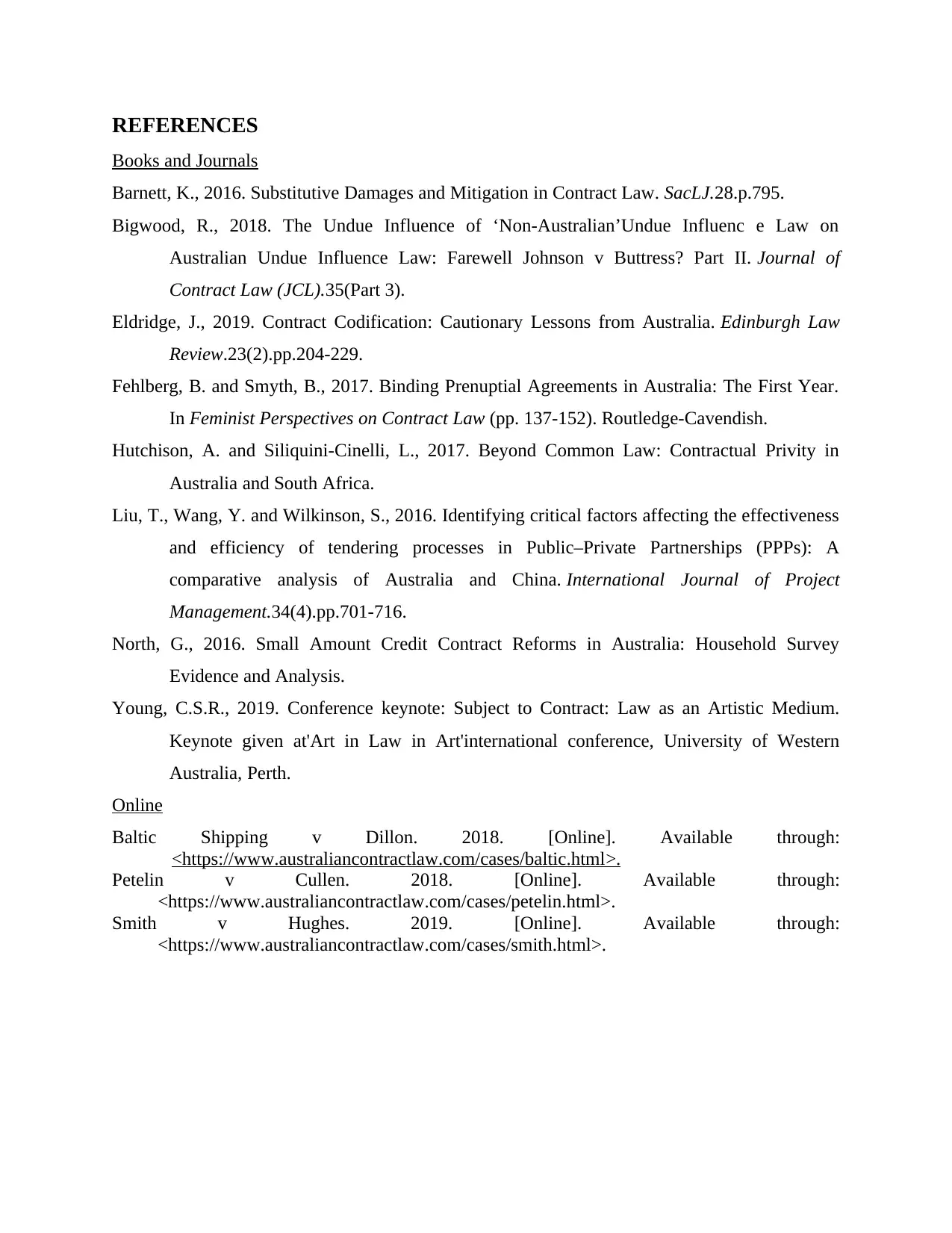
REFERENCES
Books and Journals
Barnett, K., 2016. Substitutive Damages and Mitigation in Contract Law. SacLJ.28.p.795.
Bigwood, R., 2018. The Undue Influence of ‘Non-Australian’Undue Influenc e Law on
Australian Undue Influence Law: Farewell Johnson v Buttress? Part II. Journal of
Contract Law (JCL).35(Part 3).
Eldridge, J., 2019. Contract Codification: Cautionary Lessons from Australia. Edinburgh Law
Review.23(2).pp.204-229.
Fehlberg, B. and Smyth, B., 2017. Binding Prenuptial Agreements in Australia: The First Year.
In Feminist Perspectives on Contract Law (pp. 137-152). Routledge-Cavendish.
Hutchison, A. and Siliquini-Cinelli, L., 2017. Beyond Common Law: Contractual Privity in
Australia and South Africa.
Liu, T., Wang, Y. and Wilkinson, S., 2016. Identifying critical factors affecting the effectiveness
and efficiency of tendering processes in Public–Private Partnerships (PPPs): A
comparative analysis of Australia and China. International Journal of Project
Management.34(4).pp.701-716.
North, G., 2016. Small Amount Credit Contract Reforms in Australia: Household Survey
Evidence and Analysis.
Young, C.S.R., 2019. Conference keynote: Subject to Contract: Law as an Artistic Medium.
Keynote given at'Art in Law in Art'international conference, University of Western
Australia, Perth.
Online
Baltic Shipping v Dillon. 2018. [Online]. Available through:
<https://www.australiancontractlaw.com/cases/baltic.html>.
Petelin v Cullen. 2018. [Online]. Available through:
<https://www.australiancontractlaw.com/cases/petelin.html>.
Smith v Hughes. 2019. [Online]. Available through:
<https://www.australiancontractlaw.com/cases/smith.html>.
Books and Journals
Barnett, K., 2016. Substitutive Damages and Mitigation in Contract Law. SacLJ.28.p.795.
Bigwood, R., 2018. The Undue Influence of ‘Non-Australian’Undue Influenc e Law on
Australian Undue Influence Law: Farewell Johnson v Buttress? Part II. Journal of
Contract Law (JCL).35(Part 3).
Eldridge, J., 2019. Contract Codification: Cautionary Lessons from Australia. Edinburgh Law
Review.23(2).pp.204-229.
Fehlberg, B. and Smyth, B., 2017. Binding Prenuptial Agreements in Australia: The First Year.
In Feminist Perspectives on Contract Law (pp. 137-152). Routledge-Cavendish.
Hutchison, A. and Siliquini-Cinelli, L., 2017. Beyond Common Law: Contractual Privity in
Australia and South Africa.
Liu, T., Wang, Y. and Wilkinson, S., 2016. Identifying critical factors affecting the effectiveness
and efficiency of tendering processes in Public–Private Partnerships (PPPs): A
comparative analysis of Australia and China. International Journal of Project
Management.34(4).pp.701-716.
North, G., 2016. Small Amount Credit Contract Reforms in Australia: Household Survey
Evidence and Analysis.
Young, C.S.R., 2019. Conference keynote: Subject to Contract: Law as an Artistic Medium.
Keynote given at'Art in Law in Art'international conference, University of Western
Australia, Perth.
Online
Baltic Shipping v Dillon. 2018. [Online]. Available through:
<https://www.australiancontractlaw.com/cases/baltic.html>.
Petelin v Cullen. 2018. [Online]. Available through:
<https://www.australiancontractlaw.com/cases/petelin.html>.
Smith v Hughes. 2019. [Online]. Available through:
<https://www.australiancontractlaw.com/cases/smith.html>.
⊘ This is a preview!⊘
Do you want full access?
Subscribe today to unlock all pages.

Trusted by 1+ million students worldwide
1 out of 9
Related Documents
Your All-in-One AI-Powered Toolkit for Academic Success.
+13062052269
info@desklib.com
Available 24*7 on WhatsApp / Email
![[object Object]](/_next/static/media/star-bottom.7253800d.svg)
Unlock your academic potential
Copyright © 2020–2026 A2Z Services. All Rights Reserved. Developed and managed by ZUCOL.




